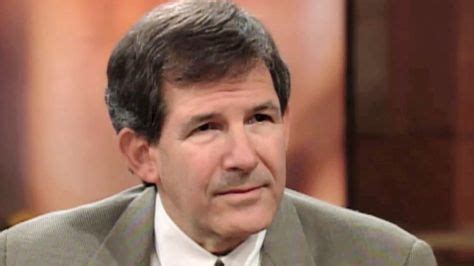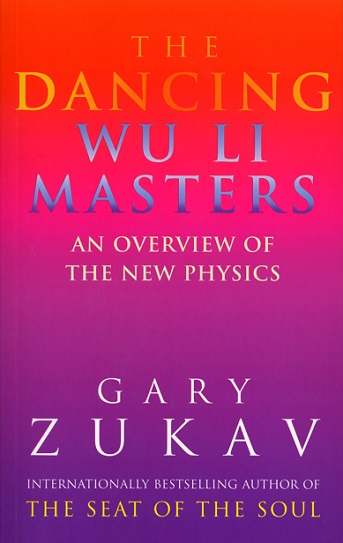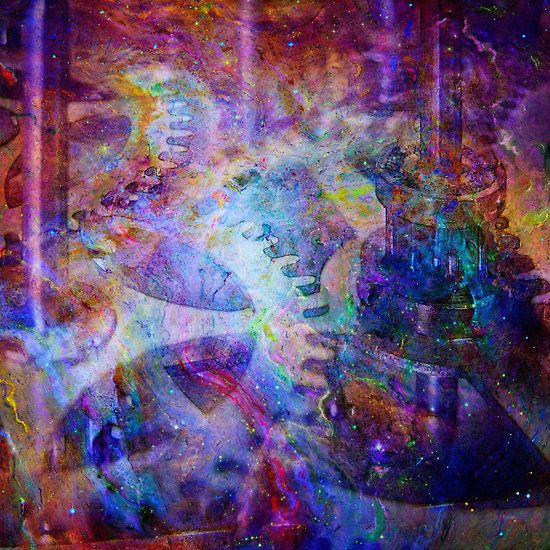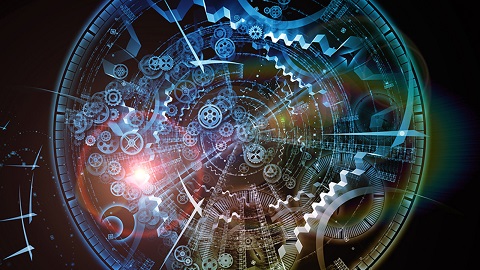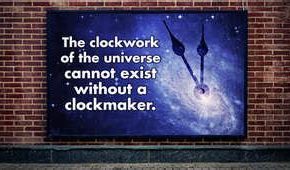|
home | what's new | other sites | contact | about |
|||||||
|
Word Gems exploring self-realization, sacred personhood, and full humanity
Quantum Mechanics
return to "Quantum Mechanics" main-page
website: https://seatofthesoul.com
Editor’s note: “Wu Li” is the Chinese word for physics; literally, “patterns of organic energy”
Excerpts from Gary Zukav's book: Most physicists believe that sooner or later they will construct an overview [theory] large enough to incorporate the [branches of physics]. [Editor's note: See Freeman Dyson's contrary opinion.] According to this point of view, we eventually will develop, in principle, a theory which is capable of explaining everything so well that there will be nothing left to explain. This does not mean, of course, that our explanation necessarily will reflect the way things actually are. We still will not be able to open the watch, as Einstein put it [to see what's inside the mysterious watch], but every occurrence in the real world (inside the watch) will be accounted for by a corresponding element of our final super-theory. Editor's note: This one-to-one correspondence is an exceedingly major concept. See notes below.
We will have, at last, a theory that is consistent within itself and which explains all observable phenomena. Einstein called this state the "ideal limit of knowledge."' Editor's note: That is, this "ideal limit of knowledge" will occur when all elements of reality are accounted for in a "super-theory" of unification. This way of thinking runs into quantum mechanics the same way that the car runs into the proverbial brick wall. Einstein spent a large portion of his career arguing against quantum mechanics, even though he himself made major contributions to its development… A "quantum" is a [smallest] quantity of something, a specific amount. "Mechanics" is the study of motion. Therefore, "quantum mechanics" is the study of the motion of quantities. Quantum theory says that nature comes in [specifically-measured] bits and pieces (quanta), and quantum mechanics is the study of this phenomenon… Newton’s laws of motion describe what happens to a moving object. [Within Newtonianism, it’s popularly believed that if] we know the laws of motion, we can predict the future of a moving object, provided that we know certain things about it initially. The more initial information that we have, the more accurate our predictions will be. We also can predict (predict backward in time) the past history of a given object. For example, if we know the present position and velocity of the earth, the moon and the sun, we can predict where the earth will be in relation to the moon and the sun at any particular time in the future, giving us a foreknowledge of eclipses, seasons and so on. Editor's note: And here, just here, by way of contradistinction, we see the meaning of "quantum mechanics" describing the new physics. "Mechanics" means "motion," and this is set against, in terms of answering, the great Newton with his "laws of motion." Newtonianism works only on the macro-level, and so QM offers itself as "laws of motion" on the micro-level, unaddressed by Newton. This principle was explained in an earlier article. In like manner, we can calculate where the earth has been in relation to the moon and the sun, and when similar phenomena occurred in the past. Without Newtonian physics the space program would not be possible. Moon probes are launched at the precise moment when the launch site on the earth (which simultaneously is rotating around its axis and moving forward through space) is in a position relative to the landing zone on the moon (which also is rotating and moving) such that the path traversed by the spacecraft is the shortest possible.
The calculations of the earth, moon, and spacecraft movements are done by computer, but the mechanics used are the same ones that are described in Newton's Principia. In practice, [however,] it is very difficult to know all the initial circumstances pertaining to an event. Even a simple action such as bouncing a ball off a wall is surprisingly complex. The shape, size, elasticity, and momentum of the ball, the angle at which it was thrown, the density, pressure, humidity, and temperature of the air, the shape, hardness and position of the wall, to name a few of the essential elements, are all required to know where and when the ball will land. It is increasingly difficult to obtain all of the data necessary for accurate predictions when more complex actions are involved. According to the old physics, however, it is possible, in principle, to predict exactly how a given event is going to unfold, if we have enough information about it. In practice, it is only the enormity of the task that prevents us from accomplishing it. The ability to predict the future based on a knowledge of the present and the laws of motion gave our ancestors a power they had never known. However, these concepts carry within them a very dispiriting logic. If the laws of nature determine the future of an event, then, given enough information, we could have predicted our present at some time in the past; that [same] time in the past also could have been predicted at a time still earlier. In short, if we are to accept the mechanistic determination of Newtonian physics—if the universe really is a great machine—then from the moment that the universe was created and set into motion, everything that was to happen in it already was determined.
According to this philosophy, we may seem to have a will of our own and the ability to alter the course of events in our lives, but we do not. Everything, from the beginning of time, has been predetermined, including our illusion of having a free will. The universe is a prerecorded tape playing itself out in the only way that it can. The status of men is immeasurably more dismal than it was before the advent of science. The Great Machine runs blindly on, and all things in it are but cogs. According to quantum mechanics, however, it is not possible, even in principle, to know enough about the present to make a complete prediction about the future. Even if we have the time and the determination, it is not possible. Even if we have the best possible measuring devices, it is not possible. It is not a matter of the size of the task or the inefficiency of detectors. The very nature of things is such that we must choose which aspect of them [among various factors] we wish to know best, for we can know only one of them with precision. As Niels Bohr, another founder of quantum mechanics, put it, “in quantum mechanics, we are not dealing with an arbitrary renunciation of a more detailed analysis of atomic phenomena, but with a recognition that such an analysis is in principle excluded.” For example, imagine an object moving through space. It has both a position and a momentum which we can measure. This is an example of the old (Newtonian) physics (momentum is a combination of how big an object is, how fast it is going and the direction that it is moving). Since we can determine both the position and the momentum of the [macro-]object at a particular time, it is not a very difficult affair to calculate where it will be at some point in the future. If we see an airplane flying north at two hundred miles per hour, we know that in one hour it will be two hundred miles farther north, if it does not change its course or speed. The mind-expanding discovery of quantum mechanics is that Newtonian physics does not apply to subatomic phenomena. In the subatomic realm, we cannot know both the position and the momentum of a particle with absolute precision. We can know both, approximately, but the more we know about one, the less we know about the other. We can know either of them precisely, but, in that case, we can know nothing about the other. This is Werner Heisenberg's uncertainty principle. As incredible as it seems, it has been verified repeatedly by experiment. Of course, if we picture a moving particle, it is very difficult to imagine not being able to measure both its position and momentum. Not to be able to do so defies our common sense... Since we cannot determine both the position and momentum of subatomic particles, we cannot predict much about them. Accordingly, quantum mechanics does not, and cannot, predict specific events. It does, however, predict probabilities. Probabilities are the odds that something is ... or ... is not going to happen. Quantum theory can predict the probability of a microscopic event with the same precision that Newtonian physics can predict the actual occurrence of a macroscopic event. Newtonian physics says, if such and such is the case now, then such and such is going to happen next. Quantum mechanics says, if such and such is the case now, then the probability that such and such is going to happen next is (whatever it's calculated to be). We never can know with certainty what will happen to the particle that we are observing. All that we can know for sure are the probabilities for it to behave in certain ways. This is the most that we can know because the two data which must be included in a Newtonian calculation, position and momentum, cannot both be known with precision.
We must choose, by the selection of our experiment, which one we want to measure most accurately. The lesson of Newtonian physics is that the universe is governed by laws that are susceptible to rational understanding. By applying these laws we extend our knowledge of, and therefore our influence over, our environment. Newton was a religious person. He saw his laws as manifestations of God's perfection ... Newton’s laws served man’s cause well. They enhanced his dignity and vindicated his importance in the universe. Following the Middle Ages, the new field of science (Natural Philosophy) came like a fresh breeze to revitalize the spirit. It is ironic that, in the end, Natural Philosophy reduced the status of men to that of helpless cogs in a machine whose functioning had been preordained from the day of its creation. Contrary to Newtonian physics, quantum mechanics tells us that our knowledge of what governs events on the subatomic level is not nearly what we assumed it would be. It tells us that we cannot predict subatomic phenomena with any certainty. We only can predict their probabilities.
... Not only do we influence our reality, but, in some degree, we actually create it. Because it is the nature of things that we can know either the momentum of a particle or its position, but not both, we must choose which of these two properties we want to determine. Metaphysically, this is very close to saying that we create certain properties because we choose to measure those properties. Said another way, it is possible that we create something that has position, for example, like a particle, because we are intent on determining position, and it is impossible to determine position without having something occupying the position that we want to determine. Quantum physicists ponder questions like, Did a particle with momentum exist before we conducted an experiment to measure its momentum? Did a particle with position exist before we conducted an experiment to measure its position? and Did any particles exist at all before we thought about them and measured them? Did we create the particles that we are experimenting with? Incredible as it sounds, this is a possibility that many physicists recognize. John Wheeler, a well-known physicist at Princeton, wrote, “May the universe in some strange sense be brought into being by the participation of those who participate? The vital act is the act of participation. ‘Participator’ is the incontrovertible new concept given by quantum mechanics. It strikes down the term ‘observer’ of classical theory, the man who stands safely behind the thick glass wall and watches what goes on without taking part. It can’t be done, quantum mechanics says.” ... Newtonian physics and quantum mechanics are partners in a double irony: Newtonian physics is based upon the idea of laws which govern phenomena and the power inherent in understanding them, but it leads to impotence in the face of a Great Machine which is the universe. Quantum mechanics is based upon the idea of minimal knowledge of future phenomena (we are limited to knowing probabilities), but it leads to the possibility that our reality is what we choose to make it. This brings us to the central philosophical issue of quantum mechanics, namely, “What is it that quantum mechanics describes?” Put another way, quantum mechanics statistically describes the overall behavior and/or predicts the probabilities of the individual behavior of what? In the autumn of 1927, physicists working with the new physics met in Brussels Belgium, to ask themselves this question, among others. What they decided there became known as the Copenhagen Interpretation of Quantum Mechanics [which] marks the emergence of the new physics as a consistent way of viewing the world… The question among the physicists at Brussels was not whether Newtonian mechanics could be adapted to subatomic phenomena (it was clear that it could not), but rather, what was to replace it? The Copenhagen Interpretation … says, in effect, that it does not matter what quantum mechanics is about. The important thing is that it works in all possible experimental situations. This is one of the most important statements in the history of science. The Copenhagen Interpretation of Quantum Mechanics began a monumental reunion which was all but unnoticed at the time. The rational part of our psyche, typified by [Newtonian] science, began to merge again with that other part of us which we had ignored since the 1700s -- our [so-called] irrational [intuitive] side. The scientific idea of truth traditionally had been anchored in an absolute truth somewhere “out there”; that is, an absolute truth with an independent existence. The closer that we came in our approximations to the absolute truth, the truer our theories were said to be. Although we might never be able to perceive the absolute truth directly—or to open the watch, as Einstein put it [that is, to see inside a mysterious watch to find out how it works]—still, we tried to construct theories, such that, for every facet of absolute truth, there was a corresponding element in our theories. The Copenhagen Interpretation does away with this idea of a one-to-one correspondence between reality and theory. This is another way of saying what we have said before: Quantum mechanics discards the laws governing individual events and states directly the laws governing aggregations. It is very pragmatic. The philosophy of pragmatism goes something like this: The mind is such that it deals only with ideas. It is not possible for the mind to relate to anything other than ideas. Therefore, it is not correct to think that the mind actually can ponder reality. All that the mind can ponder is its ideas about reality... Therefore, whether or not something is true is not a matter of how closely it corresponds to the absolute truth but of how consistent it is with our experience. The extraordinary importance of the Copenhagen Interpretation lies in the fact that, for the first time, scientists attempting to formulate a consistent physics were forced, by their own findings, to acknowledge that a complete understanding of reality lies beyond the capabilities of rational thought. It was this that Einstein could not accept... But the deed was done. The new physics was based not upon absolute truth but upon us. Henry Pierce Stapp, physicist at the Lawrence Berkeley Laboratory, expressed this eloquently: “The Copenhagen Interpretation of Quantum Mechanics was essentially a rejection of the presumption that nature could be understood in terms of elementary space-time realities. According to the new view, the complete description of nature, at the atomic level, was given by probability functions that referred, not to underlying microscopic space-time realities but, rather, to the macroscopic objects of sense experience. The theoretical structure did not extend down and anchor itself on fundamental microscopic space-time realities. Instead it turned back and anchored itself in the concrete sense realities that form the basis of social life. This pragmatic description is to be contrasted with descriptions that attempt to peer behind the scenes and tell us what is really happening.”
Another way of understanding the Copenhagen Interpretation (in retrospect) is in terms of split-brain analysis. The human brain is divided into two halves… we have discovered a remarkable fact. Generally speaking, the left side of our brain functions in a different manner than the right side. Each of our two brains sees the world in a different way. The left side of our brain perceives the world in a linear manner. It tends to organize sensory input into the form of points on a line with some points coming before others. For example, language which is linear (the words which you are reading flow along a line from left to right) is a function of the left hemisphere. The left hemisphere functions logically and rationally. It is the left side of the brain which creates the concept of causality, the image that one thing causes another because it always precedes it… The left side of our brain tends to ask certain questions of its sensory input. The right side of our brain tends to accept what it is given more freely. Roughly speaking, the left hemisphere is rational and the right hemisphere is 'irrational” [intuitive]. The advent of [modern] science [with Descartes, in the seventeenth century] marks the beginning of the ascent of left hemispheric thinking into the dominant mode of Western cognition and the descent of right hemispheric thinking into the underground status from which it did not emerge (with scientific recognition) until Freud's discovery of the unconscious, which, of course, he labeled dark mysterious and irrational (because that is how the left hemisphere views the right hemisphere).
The Copenhagen Interpretation was, in effect, a recognition of the limitations of left hemispheric thought, although the physicists at Brussels in 1927 could not have thought in those terms. It was also a recognition of those psychic aspects which long had been ignored in a rationalistic society… To stand in awe and wonder is to understand in a very specific way, even if that understanding cannot be described [with words]. The subjective experience of wonder is a message to the rational mind that the object of wonder is being perceived and understood in ways other than the rational. The next time you are awed by something let the feeling flow freely through you and do not try to "understand" it. You will find that you do understand, but in a way that you will not be able to put into words. You are perceiving intuitively, through your right hemisphere. It has not atrophied from lack of use, but our skill in listening to it has been dulled by three centuries of neglect. [Editor’s note: See the item of “Isaiah listening” on the “creativity” page.]
|
|||||||
|
|
